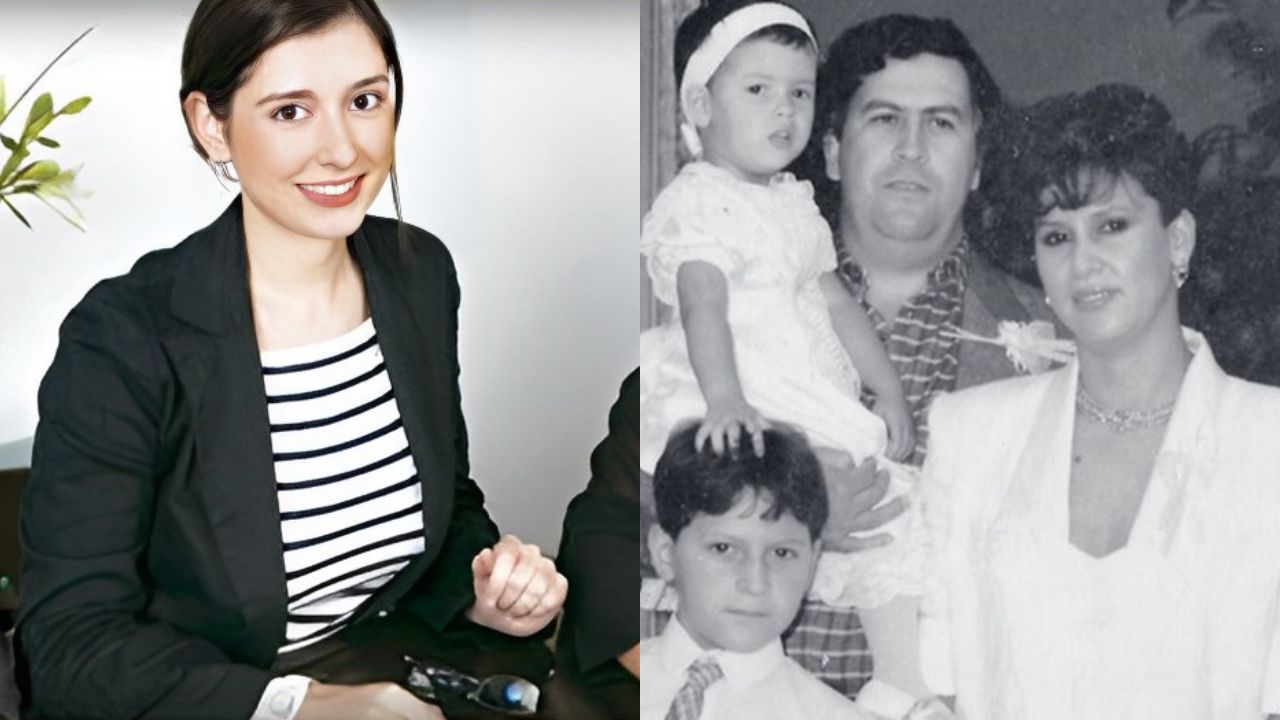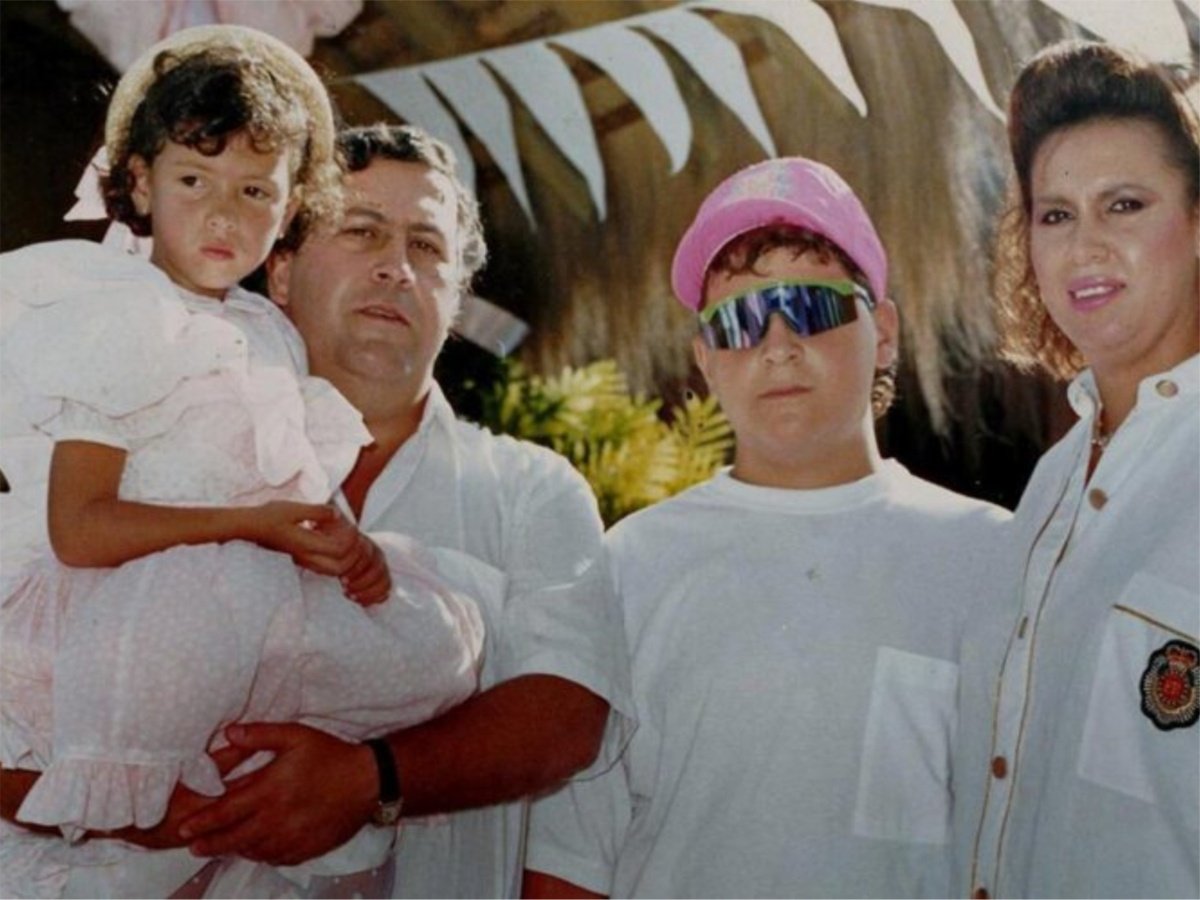When you hear the name Pablo Escobar, it’s hard not to picture the infamous drug lord who once ruled the cocaine trade with an iron fist. But beyond the headlines and crime dramas lies a personal side to this complex figure—his family. And one name that often sparks curiosity is his daughter. Who exactly is the daughter of Pablo Escobar? What’s her story? Let’s dive in and uncover some truths, myths, and everything in between.
Now, we’re talking about someone whose life has been shaped by one of the most notorious figures in modern history. Imagine growing up as the child of a man known for his ruthlessness and power. That’s the reality for Manuela Escobar, Pablo’s only daughter. Her journey isn’t just about living in the shadow of her father; it’s about finding her own identity amidst the chaos of her past.
So, why does this matter? Because understanding Manuela’s story gives us a glimpse into the human side of Pablo Escobar—a side rarely shown in movies or documentaries. It’s more than just a tale of a crime empire; it’s about family, legacy, and redemption. Stick around because this is going to get real interesting, trust me.
Read also:Victoria Jane Verstappen The Rising Star You Need To Know About
Biography of Manuela Escobar
Let’s start with the basics. Manuela Escobar, born on February 4, 1989, is the youngest child of Pablo Escobar and his wife Maria Victoria Henao. Unlike her older brother, Juan Pablo Escobar, Manuela didn’t grow up knowing her father’s criminal empire. In fact, much of her early life was spent trying to escape the shadow cast by her infamous dad.
Her childhood wasn’t exactly normal. Growing up in Colombia during the height of her father’s reign meant living under constant threat. After Pablo’s death in 1993, things only got harder for Manuela and her family. They had to flee their home, adopt new identities, and start fresh in a world that already judged them based on their last name.
Early Life and Family Background
Manuela’s early years were filled with luxury—at least on the surface. The Escobar family lived in opulence, surrounded by wealth and privilege. But beneath all the glamour lay the harsh reality of living in fear. Pablo’s enemies were always lurking, and the family knew they could be targeted at any moment.
When Pablo died, Manuela was just four years old. Too young to fully grasp what happened, but old enough to feel the weight of her family’s new reality. Her mother, Maria Victoria, worked tirelessly to protect her children and give them a normal life despite the circumstances.
Manuela Escobar's Personal Details
| Full Name | Manuela Escobar Henao |
|---|---|
| Date of Birth | February 4, 1989 |
| Place of Birth | Medellín, Colombia |
| Parents | Pablo Escobar & Maria Victoria Henao |
| Siblings | Juan Pablo Escobar (older brother) |
| Occupation | Author, Activist |
Growing Up in the Shadow of Pablo Escobar
Being the daughter of Pablo Escobar isn’t exactly a recipe for a peaceful life. Manuela grew up in a world where her last name carried baggage—both good and bad. While some saw her as the princess of the Medellín Cartel, others viewed her as a symbol of the violence and destruction her father caused.
After Pablo’s death, Manuela and her family had to adapt to a completely different lifestyle. They changed their names, moved to Argentina, and tried to rebuild their lives away from the public eye. For Manuela, this meant starting over in a new country, learning a new language, and dealing with the stigma attached to her family name.
Read also:Queen Kalin Leaked Onlyfans The Untold Story Behind The Viral Sensation
Life After Pablo Escobar
In Argentina, Manuela adopted the name Manuela Santos and focused on building a life far removed from her father’s legacy. She excelled in school, developed a passion for writing, and eventually became an author. Her books explore themes of identity, family, and the struggle to overcome the past.
But let’s be real—living with the name “Escobar” isn’t easy. Even today, Manuela faces questions and assumptions about her connection to her father. Yet, she chooses to use her platform to promote peace and understanding rather than resentment.
The Public Perception of Manuela Escobar
People love to speculate about the lives of famous criminals’ families. Is Manuela like her father? Does she carry the same ambition and ruthlessness? Or is she completely different? The truth is, Manuela is her own person. She’s made it clear that she doesn’t want to follow in her father’s footsteps.
Through interviews and her writings, Manuela has shared her perspective on her father’s legacy. She acknowledges the harm he caused but also emphasizes the importance of moving forward and learning from the past. It’s a message of hope and resilience that resonates with many.
Myths vs. Reality
There are plenty of myths surrounding Manuela and her family. Some people believe she inherited her father’s wealth, while others think she’s involved in criminal activities. None of that is true. In reality, Manuela has worked hard to create her own path, separate from her father’s legacy.
She’s spoken out against the glorification of her father in popular culture, pointing out how it distorts the truth and ignores the suffering caused by his actions. It’s a powerful stance that shows her maturity and understanding of the world.
Manuela Escobar as an Author
If there’s one thing Manuela Escobar excels at, it’s storytelling. Her debut book, “Sins of My Father,” is a raw and emotional account of growing up in the shadow of Pablo Escobar. It’s not just a memoir—it’s a call for change and a reminder of the human cost of crime.
Her writing style is honest and relatable, making her books accessible to readers from all walks of life. By sharing her experiences, Manuela hopes to inspire others to confront their own pasts and strive for a better future.
Themes in Her Writing
Manuela’s work often explores themes of identity, forgiveness, and redemption. She challenges readers to look beyond the headlines and see the people behind the stories. It’s a powerful message that encourages empathy and understanding.
- Identity: How do you define yourself when the world already has an opinion about who you are?
- Forgiveness: Can you forgive someone who has caused so much harm?
- Redemption: Is it possible to break free from your past and create a new future?
Manuela's Advocacy Work
Beyond writing, Manuela is also an advocate for social justice and peace. She uses her platform to raise awareness about issues like drug violence, inequality, and the impact of crime on communities. It’s her way of honoring the victims of her father’s actions while also promoting positive change.
She’s collaborated with organizations and spoken at events, sharing her story and encouraging others to join the fight for a better world. It’s a testament to her commitment to making a difference, no matter how difficult the road may be.
Impact on Society
Manuela’s advocacy work has had a significant impact, particularly in Colombia. Her efforts have helped shine a light on the human side of the drug war, highlighting the stories of those affected by violence and crime. It’s a crucial reminder that behind every statistic is a person with dreams, hopes, and fears.
Her message of hope and reconciliation resonates with many, proving that even the darkest legacies can be transformed into something positive.
Lessons Learned from Manuela Escobar
What can we learn from Manuela’s story? A lot, actually. She shows us that identity isn’t defined by your past or your family name. Instead, it’s about the choices you make and the actions you take. Despite the challenges she faced, Manuela chose to create her own path, separate from her father’s legacy.
She also teaches us the importance of empathy and understanding. It’s easy to judge someone based on their background, but Manuela’s story reminds us that there’s always more to the picture. By listening to her experiences, we can gain a deeper appreciation for the complexities of life.
Key Takeaways
- Identity is shaped by choices, not circumstances.
- Empathy and understanding are crucial for healing and growth.
- Even the darkest legacies can be transformed into something positive.
Conclusion: The Legacy of Manuela Escobar
So, who is the daughter of Pablo Escobar? She’s Manuela Escobar—a woman who’s defied expectations, overcome adversity, and built a life of her own. Her story is a testament to the power of resilience, forgiveness, and hope.
As we wrap up this article, I encourage you to reflect on what you’ve learned. Think about how Manuela’s journey can inspire you to confront your own challenges and create a brighter future. And if you enjoyed this piece, don’t forget to share it with others or leave a comment below. Together, let’s keep the conversation going!
Table of Contents


